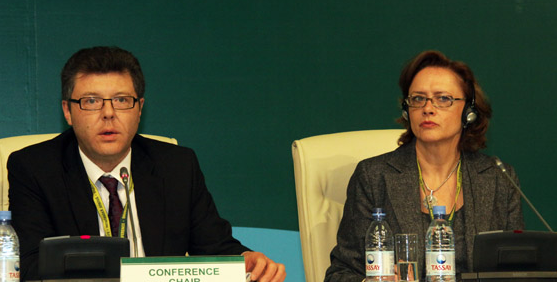Participants at the seventh “Environment for Europe” Ministerial Conference addressed: effective policies to protect water-related ecosystems; linkages between human health and water; water management adaptation to climate change; cooperation in transboundary basins; water efficiency; and effective green economy policies in the transport, housing, energy, agriculture and education sectors.
 23 September 2011: The seventh “Environment for Europe” Ministerial Conference concluded with the adoption of a Ministerial Declaration titled “Save water, grow green!” Through the Declaration, ministers agree to take the lead in the transition to a green economy and to make substantive contributions to the discussions on green economy within the context of sustainable development, poverty alleviation and the UN Conference on Sustainable Development (UNCSD, or Rio+20).
23 September 2011: The seventh “Environment for Europe” Ministerial Conference concluded with the adoption of a Ministerial Declaration titled “Save water, grow green!” Through the Declaration, ministers agree to take the lead in the transition to a green economy and to make substantive contributions to the discussions on green economy within the context of sustainable development, poverty alleviation and the UN Conference on Sustainable Development (UNCSD, or Rio+20).
The high-level meeting convened in Astana, Kazakhstan, from 21-23 September 2011, under the themes “sustainable management of water and water-related ecosystems,” and “greening the economy: mainstreaming the environment into economic development.” During the Conference, participants addressed: effective policies to protect water-related ecosystems; linkages between human health and water; water management adaptation to climate change; cooperation in transboundary basins; water efficiency; and effective green economy policies in the transport, housing, energy, agriculture and education sectors. Participants called for the use of payments for ecosystem services and a common UNECE method for valuing ecosystems services; recognized integrated water resource management for resilience and vulnerability; stressed the need to address climate change impacts and promote adaptation; and emphasized that effective water policies can stimulate innovation, investment, job creation and new business models contributing to the green economy.
Participants further agreed that, inter alia: the transition to a green economy should engage stakeholders, including consumers and businesses, through education and information-based policy tools and labeling; governments should focus on creating green markets; energy subsidies should be replaced by more targeted sectoral policies; targets and indicators for the green economy should be emphasized, and ways to discard the GDP concept should be identified at Rio+20; financing decisions should include sustainability criteria; and an internationally agreed roadmap for the green economy should be one outcome of Rio+20, including a political commitment and a toolbox with concrete instruments, with a clear distribution of responsibilities.
The Environment for Europe process, started in 1991, is a partnership of member States within the UN Economic Commission for Europe (UNECE) region, UN organizations represented in the region, other intergovernmental organizations, regional environmental centers, non-governmental organizations, the private sector and other major groups. [IISD RS Coverage] [Ban Ki-moon’s Statement] [Achim Steiner’s Statement] [UNECE Press Release] [Meeting Website] [UN Press Release]